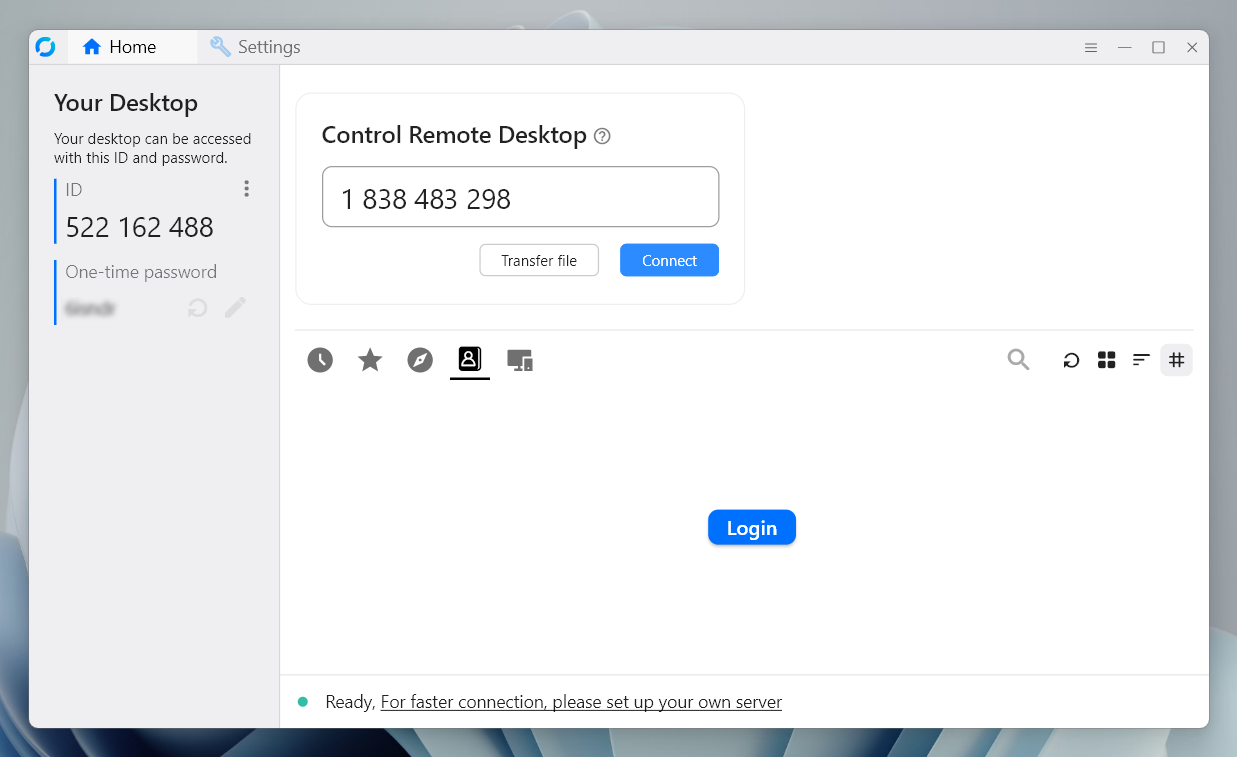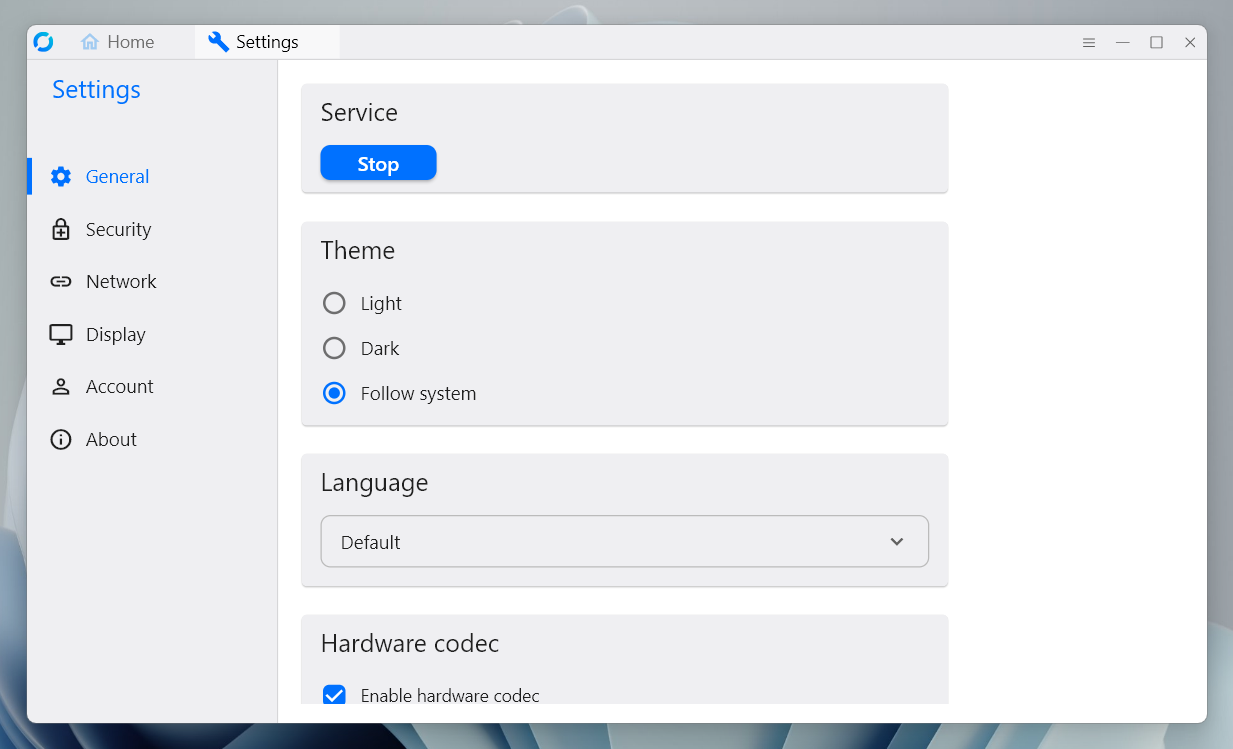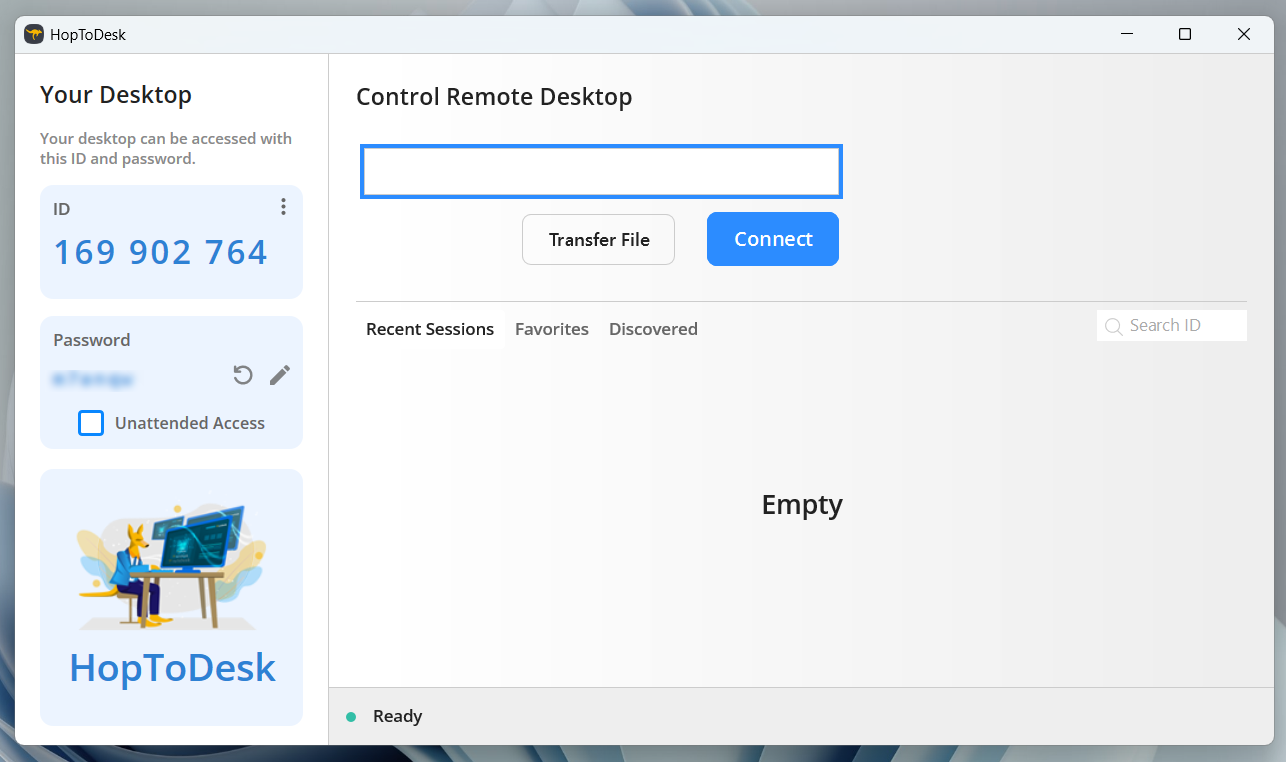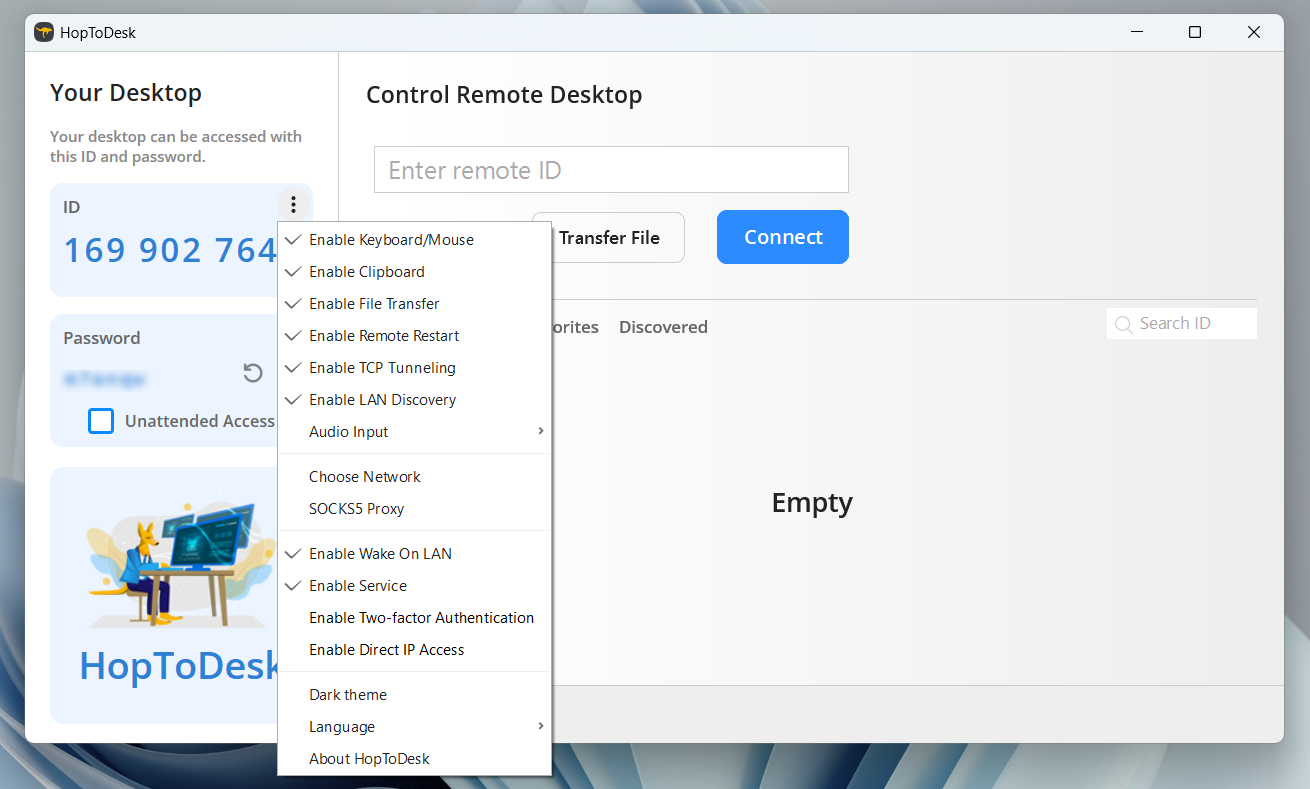RustDesk and HopToDesk are some of the leading open-source remote desktop tools today. They offer cutting-edge features for secure, flexible, and affordable remote support solutions free from vendor lock-in.
With a growing demand for reliable remote access, we compare these tools based on their strengths and unique features.
Overview
RustDesk

RustDesk is an open-source remote desktop software built using the Rust programming language. It has a modern and intuitive interface and supports multiple operating systems, such as Windows, macOS, Linux, iOS, and Android. RustDesk can deliver a seamless remote experience with innovative features like adaptive bitrate, hardware/software rendering, and audio support. And for enhanced security, RustDesk uses end-to-end encryption in peer-to-peer connections.
While it has limited customization options and mobile support services, RustDesk is still a high-performing, secure remote access with cross-platform functionalities, active development, and top-level security.
HopToDesk

HopToDesk, originally forked from RustDesk, is free, cross-platform remote desktop software for personal and business use. A recent review indicates that this tool augmented various improvements to RustDesk’s core functionalities, such as enhanced mobile accessibility, end-to-end encryption verification, and support for ChromeOS and Raspberry Pi.
For easy and reliable remote support, HopToDesk features a simple setup and secure remote sessions. This platform is completely free and has no hidden costs, so it is highly accessible to all users. Even as free software, HopToDesk continues to enhance its network and security features to distinguish itself as a competitive alternative to prominent remote desktop solutions like AnyDesk and TeamViewer.
Feature
RustDesk
RustDesk has a wide range of features ideal for reliable and secure personal and professional remote access. To deliver exceptional remote desktop experience, this tool supports file transfer, session recording, audio, and multi-monitor setups.
Virtually any file type can be transferred between devices in RustDesk. And for uninterrupted remote sessions, this tool also features synchronized clipboards. Users may also engage in real-time chat for easy communication as well as unattended access for a convenient remote support experience.
HopToDesk
Many HopToDesk features resemble those of RustDesk, such as file transfer, session recording, audio support, multi-monitor setups, and real-time chat. It also supports clipboard synchronization and mobile accessibility for cross-device versatility. But what makes HopToDesk stand out is its dashboard feature, which allows users to monitor saved devices with a time status indicator for better device management.
Moreover, HopToDesk integrates with AWS and Cloudflare for private cloud deployments. This tool also features user interface improvements for a smooth and intuitive user experience.
Interface Comparison
Both platforms offer a clean and user-friendly interface for quick and easy navigation. But they differ in the presentation of their setting menus and some minor design details.
Operating System
While both tools work with multiple operating systems, HopToDesk has a slight edge because it offers more options compared to the core RustDesk version.
Pros And Cons
Presented below are the respective upsides and downsides of RustDesk and HopToDesk.
RustDesk
Pros
- Lightweight And User-Friendly
- Runs Fast With Utmost Efficiency
- Multiple Remote Desktop Features
- Prompt Customer Support
Cons
- Limited Customization Choices
- Not As Robust On Mobile Devices
- Lacks Some Traditional Support Features
- Some Features Are Not Open-Source
HopToDesk
Pros
- Easy Setup Process
- Offers Cross-Platform Support
- Top-level Encryption for Secure Sessions
- Wide range of Remote Access Tools
Cons
- Absence of Advanced Professional IT Administrative Tools
- Few Customization Options
- Limited Software Updates
Pricing
RustDesk
Free Plan. The Free plan offers basic features such as online status and community support at $0. RustDesk’s free plan is ideal for users seeking a basic, open-source, and self-hosted solution.
Individual Plan. Costs $9.90/month (billed annually), the Individual plan supports one login user, 20 managed devices, and unlimited concurrent connections. For improved control over device management and security, this plan also features two-factor authentication, a web console, an address book, and audit logs.
Basic Plan. At $19.90/month (billed annually), the Basic plan features everything included in the Individual plan, with added support for 10 login users and 100 managed devices. This plan also includes additional features like OIDC (SSO), LDAP integration, cross-group access, and a custom client generator, which are highly ideal for small and medium-sized businesses.
Customized Plan. Also priced at $19.90/month (billed annually), the Customized plan includes all features from the Basic plan, along with the added flexibility of adjusting the number of login users and managed devices. Users can also purchase additional users ($1 each) and devices ($0.10 each), making it highly scalable to meet specific business needs.
HopToDesk
HopToDesk is free for personal and business use, with no hidden costs or limitations. Hence, it is perfect for users looking for a cost-effective solution for remote desktop access across different devices and platforms.
Pricing plans | RustDesk | HopToDesk |
Free Version | Yes | Yes |
Level 1 | $9.90/month | N/A |
Level 2 | $19.90/month | N/A |
Level 3 | $19.90/month $1 for each additional user | N/A |
Best Alternative to RustDesk and HopToDesk
If you’re unsure whether to go with RustDesk or HopToDesk, trying out an alternative like HelpWire might be a great option. Developed for on-demand and unattended remote access, HelpWire delivers fast connections, frequent updates, responsive support, and robust tools for effortless client and team management. It is a reliable, easy-to-use, and secure remote desktop solution.
Why Choose HelpWire?
✅ Multi-Platform Compatibility – Works consistently across all major operating systems, including Windows, macOS, and Linux.
✅ Comprehensive Client & Team Management – Efficiently organize client sessions, track session history, and assign roles to team members for streamlined operations.
✅ On-the-Go Remote Support – Establish secure connections through auto-generated links to reduce setup time and eliminate delays.
✅ Easy File Sharing – Transfer files directly within remote sessions using simple copy-paste functionality.
✅ In-Session Chat – Enable real-time collaboration among multiple support technicians with integrated chat during active sessions.
Robust Security Measures – Incorporates AES-256 encryption, permission-based access, and HTTPS/WSS protocols to safeguard data and connections, all hosted in secure, high-reliability data centers.
Pros
- Easy-to-navigate and Clean Interface
- Swift and Uninterrupted Remote Sessions
- Innovative Client and Team Management Tools
- 24/7 Responsive Support
- Ongoing Feature Enhancements and Updates
Cons
- Limited Support For Mobile Platforms
- Lacks Built-In Session Recording
Final Thoughts
RustDesk and HopToDesk are both capable open-source remote desktop programs with distinct advantages. RustDesk is a security-centered tool with active development, while HopToDesk delivers an enhanced experience with its broader OS support and a more user-friendly approach. Either can be a solid fit depending on your needs, especially for self-hosting or simple session configuration.
But for a more reliable and quick-to-deploy solution without a cost and technical configuration, HelpWire serves as a great HopToDesk and RustDesk alternative. It provides stable, secure remote access across Windows, macOS, and Linux with exceptional usability and reliability.



